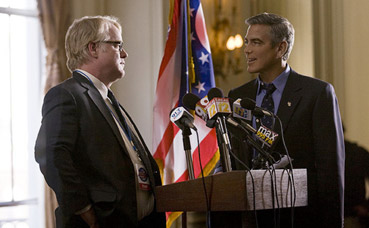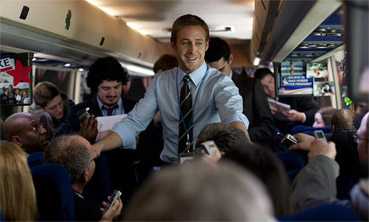"It's the right thing to do. And nothing bad happens
when you're doing the right thing." |
Stephen Myers (Ryan Gosling) |
Democrat, Republican, Independent. Knowledge of my own country's politics is somewhat lacking to say the least, and American politics mostly extends as far as what I've boredly managed to glean from the movies and to be honest, a political drama/thriller about young campaign staffers monitoring their computers and standing by the phones as poll results come in just doesn't sound all that thrilling.
But you put your faith in those you trust. Both behind and in front of the camera, George Clooney has played a hand in crafting the very best political entertainments of the modern era, with the likes of Good Night & Good Luck and Syriana. This being his first non-period piece as a director, The Ides of March is certainly worthy of joining that discussion, even when it punches below the weight of all the talent on display, and is ultimately a little too trite to be as outstanding as those that preceded it.

The big draw of course is the all-star ensemble, including the likes of Philip Seymour Hoffman, Paul Giamatti, Ryan Gosling and George Clooney, who in what amounts to an extended cameo commendably dials down his star presence in the name of team spirit. Impressionable supporting turns are also carved out by Max Minghella (hustling), Evan Rachel Wood (unusually sweet) and Marisa Tomei (never sexier). A cast of this caliber accounts for getting me through the door, though it stands to reason that I'd be excited to watch this group of players in just about anything, no matter the subject. So why is it that I found myself enjoying The Ides of March as much as I did? The story, though a good one well told, is as old as the hills: one man's idealism is steadily corrupted by the shark pool in which he finds himself swimming, as he's forced to compromise what he believes in order to get ahead. A fall from grace couldn't be rote if it tried. And for that matter, why, despite being so apolitical, do I always get such a kick out of movies built around political scandal and the minions scurrying to perform damage control?
Outside of Aaron Sorkin and Mad Men, you go to political thrillers because you just don't see enough of these fast-talking, sharp-suited Sweet Smell of Success-types anymore, and this is Clooney's ace in the hole. He knows it too, and his direction and editing style accommodates the actors rather than moulding their performances.
Far more malleable are the various aids and underlings on which the film focuses. Arriving just as President Obama's own poll numbers are down and his new era of "open government" has proved yet another promise with a decidedly hollow ring, Clooney's depiction is one of democrat-on-democrat in-fighting, face-saving and vicious backstabbing. It's about playing the angles and back-door deal making. Doing whatever it takes comes first, with the "right thing" a distant second. Campaign manager Paul Zara (Philip Seymour Hoffman) is a man of weary principle who values loyalty as the only currency of worth in his game, but that currency switches hands as quickly as the various allegiances in a third act game of bluff-calling musical chairs.
As the suave, idealistic media consultant to Clooney's Democratic governor running for president, Ryan Gosling's Stephen Myers is a visually appealing yet unsympathetic protagonist, apiece with the film's overridingly cynical tone. Protagonists that test our sympathies are fine, just so long as we find them compelling, and therein lies the problem. Gosling's backstory of having run more campaigns at age thirty than most do by the time they hit forty speaks to a wealth of experience, snatched victories, near-misses and enough closet skeletons to make the guy just as fallible as any other person working the political field. So when he's asked early on to a clandestine meeting by the rival Democrat consultant Tom Duffy (Paul Giamatti, whose mole-like countenance has never been better suited), Myers' years of experience beggars belief that he would so easily agree to the meeting and fall hook, line and sinker for the set-up that puts his downfall in motion. Where it's placed the scene happens way too early in the film to gain a proper sense of what drives this sure-of-himself incorruptible to professional self-destruction. Later, Hoffman's Zara goes so far as to spell out for Stephen the conflicting persuasions for his dark side dalliance, a great moment of scene-stealing psychologizing, inserted less for audience clarification than to support the one-note Gosling's nuance-free performance.

Co-screenwriter Beau Willmon's original play, Farragut North, was focused solely on the temptations thrown Myers' way (Clooney's appearance as governor Mike Morris is an invention of the adaptation), and in this incarnation there's never any sense that Myers is weighing up the repercussions of what lures him, he simply jumps into hot water feet first. Questions of loyalty, much talked about but never hinted at in Gosling's performance, require an actor capable of showing inner turmoil whilst doing very little — and doing very little seems to be Gosling's M.O. at the moment, simmering his way through the entirety of last month's Drive. Showier, confrontational scene chewing (The Believer, Half Nelson, Blue Valentine) is his forte (and the reason I've been such a big fan for so long) but scale it back just a notch and he seems to shut down into dashingly handsome, blank-faced autism. In their showdowns, it's Philip Seymour Hoffman's sterling work that impresses most, constantly making you reassess Zara's intentions by using only his jowls, asthmatic levels of exasperation and a calculating stare. It's a portrait of everyman minimalism that's certainly his most subtle work since his Oscar-winning turn in Capote. Gosling offers no such complexity, simply interpreting the twists of the plot as best he can. These unbalanced scenes best encapsulate a film that crackles with intelligence, but is sorely lacking in edgy conflict.
|